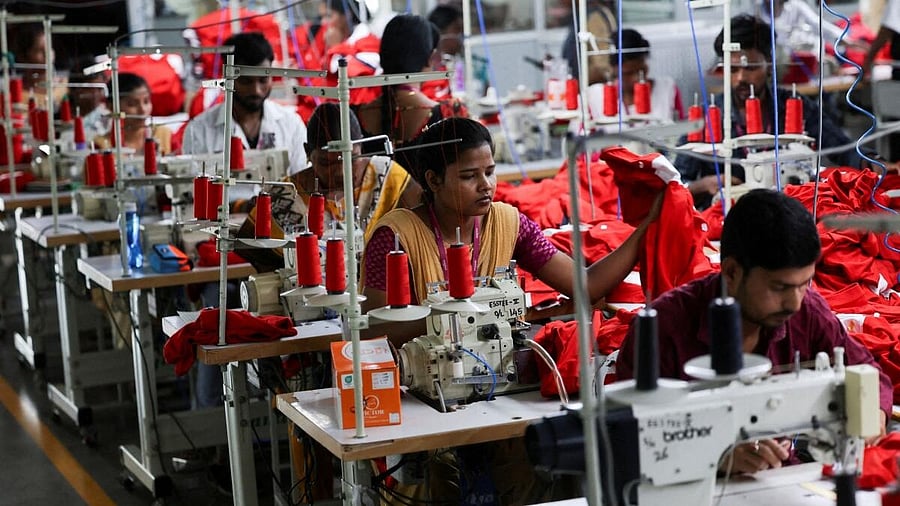
FILE PHOTO: People work at a garment factory in Tiruppur, in the Southern state of Tamil Nadu, India, April 23, 2025.
Credit: Reuters Photo
Chennai: Exporters in the knitwear and textile hubs of Tiruppur and Coimbatore are preparing for tough negotiations with their US buyers, who are demanding discounts or price reductions of up to 25%. This comes in response to the 50% tariff and penalty imposed by President Donald Trump on Indian imports, effective from Wednesday.
The Tiruppur Exporters Association (TEA) fears that manufacturers could lose Rs 4,000 crore in the coming months if buyers insist that exporters continue to hold stock meant for the US market in factories. The US accounts for 30% of knitwear exports from Tiruppur.
The situation is similar in Coimbatore and Karur, which supply kitchen linen, bed linen, and hand towels to the US in large volumes with buyers asking exporters not to ship goods made exclusively for them.
Manufacturers told DH that they cannot sustain such losses for long, as the textile and knitwear sectors already operate on thin margins of 5-8% and have appealed to the Union Government to negotiate with the US administration for an early resolution.
However, they acknowledge that the government may not be able to offer a package that fully offsets the losses from the high tariffs and penalties.
Meanwhile, the Coimbatore-based Southern India Mills’ Association (SIMA) has called for a support package similar to the one announced during the COVID-19 pandemic. “We manufacture garments for the US market in three cycles, each lasting 120 days. We believe one cycle will be lost entirely, with Rs 4,000 crore at stake. Buyers have already begun demanding heavy discounts exceeding 20%,” K M Subramanian, President, TEA, told DH. He added that the only positive aspect is that many of the orders for the US market are seasonal. Also, buyers have limited options but to accept them from Tiruppur, though they may force exporters to offer significant discounts.
“Much of the finished goods are still in factories, being held on pause. Even some goods delayed at ports have been recalled to our factories,” he explained.
Subramanian warned that if the tariffs remain at 50% and the situation does not improve, exporters will be forced to seek other markets. However, the general consensus in Tiruppur is that the US market is irreplaceable due to the sheer volume of orders and US consumer spending power.
Kumar Duraiswamy, Joint Secretary, TEA, noted that the high tariffs are problematic not only for exporters but also for importers who need goods to stock for Black Friday, Christmas, and other key festival seasons. “Buyers are demanding discounts on orders that are under production or already manufactured, while purchase orders at the sampling stage have been put on hold. Both countries need trade, and we hope for a swift resolution,” Duraiswamy added.
Dr K Selvaraju, Secretary General, SIMA, said when the US imposed a 25% tariff, exporters sought around a 6 percent discount. Now, demands for discounts have surged to over 20%.
“The government cannot create markets for us, as this market was built over a long time. If the situation worsens, production stoppages and layoffs are inevitable. We cannot accept 20% discounts given our already slim margins,” Selvaraju said, urging for a COVID-19 type relief package for the textile industry to weather this crisis.